

Wear Your Clothes Inside Out: The Fashion Statement That Shows You Care On Fashion Revolution Day. Social media has been swamped with images of people wearing their clothes inside out - and no they didn't all get dressed in the dark this morning.
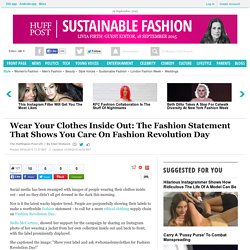
Nor is it the latest wacky hipster trend. People are purposefully showing their labels to make a worthwhile fashion statement - to call for a more ethical clothing supply chain on Fashion Revolution Day. Stella McCartney, showed her support for the campaign by sharing an Instagram photo of her wearing a jacket from her own collection inside out and back to front, with the label prominently displayed. The Superfluous Culture Makes Unisex Ethical Fashion for Locavores. Hailing from Montreal, The Superfluous Culture takes fashion to a thought-provoking level through use of oxymoron and plenty of attitude.

Synonyms of the word “superfluous” include unnecessary, being more that is sufficient, excessive – and are literal enough. But through their name alone, The Superfluous Culture sparks an intriguing discussion forcing you to reevaluate where your clothes come from and more importantly, what you should care about when it comes to fashion. From Sustainable Luxury to Luxurious Sustainability At the 1.618 Sustainable Luxury conference in Paris, major players marked a turning point in the future of high-end commerce.
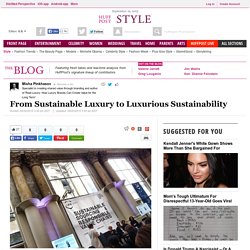
It is a rare luxury to feel that you have been part of a moment; a subtle but profound tipping point after which nothing will ever seem the same. The 1.618 Sustainable Luxury conference in Paris on April 2 was one such moment. Dedicated to the theme of Sustainable Sourcing and Responsible Value Chains, it was clear that the discussion of sustainable luxury has finally moved on from creating feel-good initiatives to recognizing the potential for creating business value. The first indication came during the roundtable on cosmetics, provided by Anne Cabotin, VP of both sales and sustainability for Symrise, creator of fragrances and flavors for the perfume, cosmetics and food industries.
Forget about cotton, we could be making textiles from banana and pineapple. Cotton makes up a third of fibre consumption in the textile industry, according to a global apparel fibre consumption report (pdf) published in 2013.
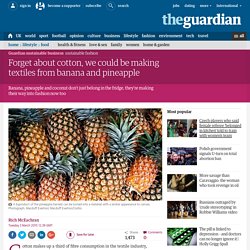
The cotton production industry is labour intensive and involves a lot of sweat, chemicals and fresh water. Could a number of innovations from natural sources and raw materials compete with the unsustainable product of the cotton plant? Banana stems Around a billion tonnes of banana plant stems are wasted each year, despite research indicating that it would only take 37kg of stems to produce a kilogram of fibre. In 2012, the Philippine Textile Research Institute concluded that banana plantations in the Philippines alone can generate over 300,000 tonnes of fibre.
H&M's $1m recycling prize is clever but no solution to fast fashion. H&M, one of the world’s largest fast fashion brands, has launched a €1m ($1.16m) recycling prize in an effort to engage innovators, technologists, scientists and entrepreneurs to find a solution to a growing problem in the clothing industry: waste and pollution.
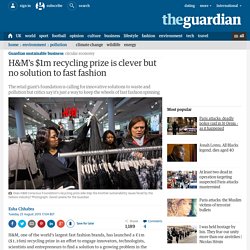
The Swedish brand’s foundation, the H&M Conscious Foundation, announced the Global Challenge Award to “catalyse green, truly groundbreaking ideas” that will “protect the earth’s natural resources by closing the loop for fashion”. It’s a clever move from the fashion giant. The challenge has public appeal (it’s open to anyone with an early stage idea) and it will bring attention to an important issue for the fashion industry. Nike and Adidas show cautious support for eco-friendly dye technology.
It has been a significant step forward for the textile sector.
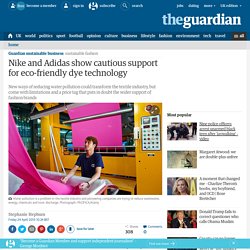
Up until now the effluent from dye houses that can often be seen in rivers flowing through the textile manufacturing areas of India, China and elsewhere is a result of unabsorbed dyes, chemicals and heavy salts that are used during the dyeing process. A number of companies, DyeCoo, ColorZen and AirDye have set out to address this pollution by designing waterless dye technology. The result is a reduction in wastewater, energy, chemicals and toxic discharge to such a degree that it could revolutionise the textile industry. Major brands including Nike and Adidas have been integrating waterless dye technologies into their product lines, but costs and limitations have experts in the textile industry worried that the support will not last. “Right now there is very low uptake of use of these technologies,” says Andrew Filarowski, technical director at Society of Dyers and Colourists.
Adidas, Parley Create World's First Sneakers Made From Ocean Trash. Adidas's newest sneaker is a load of garbage—ocean garbage, that is.
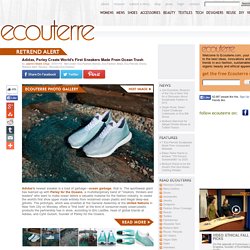
The sportswear giant has teamed up with Parley for the Oceans, a multidisciplinary band of "creators, thinkers and leaders" who want to make ocean debris a valuable material for the fashion industry, to create the world's first shoe upper made entirely from reclaimed ocean plastic and illegal deep-sea gillnets. The prototype, which was unveiled at the General Assembly at the United Nations in New York City on Monday, offers a "first look" at the kind of consumer-ready ocean-plastic products the partnership has in store, according to Eric Liedtke, head of global brands at Adidas, and Cyrill Gutsch, founder of Parley for the Oceans. “At Parley for the Oceans, we want to establish the oceans as a fundamental part of the debate around climate change,” Gutsch said. Recycled, 'sustainable' swimwear is a hot new fashion trend.
The fashion industry has been criticized for how it produces clothing quickly and cheaply.
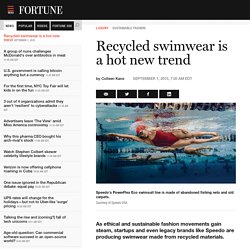
And the category of swimwear is no different — tags in bathing suits typically say “made in China,” or Thailand, or Vietnam — countries known for using sweatshop labor. But as the ethical and sustainable fashion movements gain steam, many startups are producing swimwear in nontraditional ways– sweatshop free and using what they say are more ecologically sound materials.
Even a legacy brand as massive as Speedo is beginning to sell sustainable swimwear made from recycled materials. Fur: Animals for Fashion. Update Winter 2014 – CCF News Winter 2014 (Fur Update) about the current global market for fur!
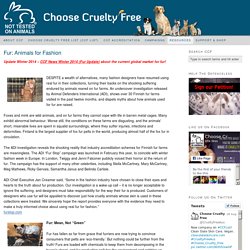
DESPITE a wealth of alternatives, many fashion designers have resumed using real fur in their collections, turning their backs on the shocking suffering endured by animals reared on fur farms. An undercover investigation released by Animal Defenders International (ADI), shows over 30 Finnish fur farms visited in the past twelve months, and dispels myths about how animals used for fur are raised. Foxes and mink are wild animals, and on fur farms they cannot cope with life in barren metal cages. Fashion against fur idea: Models Carry Handbags 'Dripping With Blood' At PETA Protest Over What Not To Wear To London Fashion Week.
Models carrying handbags "dripping with blood" took to the streets of central London today to protest the use of exotic animal skins on the catwalk.
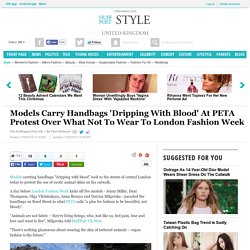
A day before London Fashion Week kicks off five models - Jenny Miller, Dani Thompson, Olga Vilchinskaya, Anna Buraya and Daryna Milgevska - paraded the handbags on Bond Street in what PETA calls "a plea for fashion to be beautiful, not bloody". "Animals are not fabric – they're living beings, who, just like us, feel pain, fear and love and want to live", Milgevska told HuffPost UK Style. "There's nothing glamorous about wearing the skin of tortured animals – vegan fashion is the future. " PETA (People for the Ethical Treatment of Animals) is an organisation that aims to protect the rights of animals. How Do You Define Sustainable Fashion? This blog is part of a month-long focus around sustainable fashion across HuffPost UK Style and Lifestyle.
Here we aim to champion some of the emerging names in fashion and shine a light on the truth about the impact our appetite for fast fashion has around the world. How do you define sustainable fashion? Grotto Sauna — PARTISANS. Meet The Black Mambas, South Africa's Majority-Female Anti-Poaching Unit. Marine Life Has HALVED In The Last 40 Years Says WWF Study. Marine life has dropped by a staggering 49 per cent since the 1970s, according to a study by the World Wildlife Fund. The study -- believed to be the largest of its kind -- examined over 5,829 populations consisting of 1,234 mammal, bird, reptile, and fish species. It states that overfishing, along with the effects of climate change are to blame for the drastic reduction in life with popular commercial fish species being the worst affected.
Mackerel and tuna populations have been almost decimated with a reduction in numbers of 70 per cent in the last 40 years with neither showing any signs of recovery. The WWF report states that the destruction of habitats has played a key role with shrimp fishing contributing to the destruction of almost a third of all seagrasses in the ocean. Climate change has also played a major part in changing the environment within which this life survives.